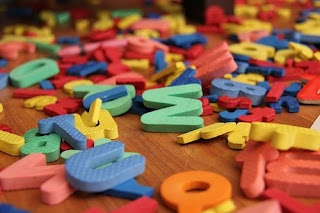 |
| Image via ambernwest/Flickr under CC |
Your brain on books.
I really, really, wish I'd brought a notebook with me. So many details have already escaped me, but here's what I remember.
Learning to Read
Conrad also said that fun activities like story time and playing with letter-shaped toys (like plastic fridge magnets) are enough to prepare kids for the image recognition used in reading. The "drill and kill" method of early reading training is not only totally unnecessary, but risks building resentment towards books. Keep reading fun, parents, and see what a difference it makes!
Reading and Bilingualism
Deacon also shared my favourite fact of the session - books are an important part of language acquisition for kids, because the text complexity of a kid's book is equivalent to the oral complexity of expert witness testimony. Which means that kids who read are learning a much deeper and richer version of their languages than kids who only speak!
Reading When Deaf or Hearing Impaired
Bonita Squires shared some really cool science on how children with hearing impairments learn language. For example, did you know that letter sounds used in speech vary in both pitch and decibel? As a result, a hearing-impaired child may hear the same spoken word as a collection of very different sounds, depending on level of background noise and the pitch of a person's voice. This lack of consistency makes it really challenging for kids to learn new vocabulary aurally.
As deaf and hearing impaired kids learn to read, however, they discover that the same letter combinations always signify the same object or concept (assuming the words are properly spelled!). That knowledge dramatically improves their language skills, in any format. In other words, fostering a love of reading in kids with hearing impairments may be even more important than in kids with normal hearing.
And Something for the Adults...
Go forth, my friends, and experience your brain on books. Need suggestions for a great title? Check out our list of Canadian science books for kids!
No comments:
Post a Comment